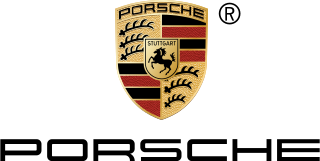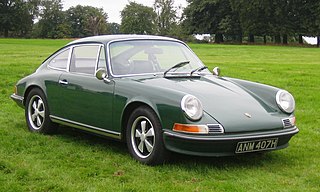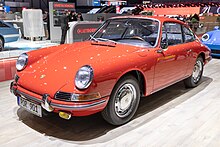
Dr. Ing. h.c. F. Porsche AG, usually shortened to Porsche, is a German automobile manufacturer specializing in high-performance sports cars, SUVs and sedans, headquartered in Stuttgart, Baden-Württemberg, Germany. The company is owned by Volkswagen AG, a controlling stake of which is owned by Porsche Automobil Holding SE.

The Porsche 924 is a sports car produced by Porsche in Neckarsulm, Germany, from 1976 until 1988. A two-door, 2+2 coupé, the 924 replaced the 912E and 914 as the company's entry-level model.

The Porsche 912 is a sports car produced by Porsche AG of Stuttgart, Germany, for the 1965 through 1969 model years. An entry-level variant of the 911, it was also offered in compact 2+2 Coupé and Targa body styles. The nimble-handling 912 was a fitted with a 1.6-liter air cooled 4-cylinder flat-4 from the last of the 356s, slightly detuned to 102 SAE horsepower at 5800 rpm. The 912's high-efficiency boxer engine, low drag, and low weight allow it to get up to 30 miles per US gallon. Priced at $4,700, more than 32,000 912s were built from April 1965 to July 1969. Sales of the 912 initially outpaced the 911, boosting the manufacturer's total production until success of the 911 was assured.

The Porsche 356 is a sports car that was first produced by Austrian company Porsche Konstruktionen GesmbH (1948–1949), and then by German company Dr. Ing. h. c. F. Porsche GmbH (1950–1965). It was Porsche's first production automobile. Earlier cars designed by the Austrian company include Cisitalia Grand Prix race car, the Volkswagen Beetle, and Auto Union Grand Prix cars.

The Porsche 914 or VW-Porsche 914 is a mid-engined sports car designed, manufactured and marketed collaboratively by Volkswagen and Porsche from 1969 until 1976. It was only available as a targa-topped two-seat roadster powered by either a flat-4 or flat-6 engine.

The Porsche 959 is a sports car manufactured by German automobile manufacturer Porsche from 1986 to 1993, first as a Group B rally car and later as a road legal production car designed to satisfy FIA homologation regulations requiring at least 200 units be produced.

The Porsche Carrera GT is a mid-engine sports car that was manufactured by German automobile manufacturer Porsche from 2004 to 2006. Sports Car International named the Carrera GT number one on its list of Top Sports Cars of the 2000s, and number eight on its Top Sports Cars of All Time list. For its advanced technology and development of its chassis, Popular Science magazine awarded it the "Best of What's New" award in 2003.

The Porsche 930 is the internal designation for the turbocharged variant of the 911 model manufactured by German automobile manufacturer Porsche between 1975 and 1989. It was the maker's top-of-the-range 911 model for its entire production duration and, at the time of its introduction, was the fastest production car available in Germany.

The Porsche 993 is the internal designation for the Porsche 911 model manufactured and sold between January 1994 and early 1998, replacing the 964. Its discontinuation marked the end of air-cooled 911 models.

The Porsche 996 is the internal designation for the 911 model manufactured by the German automaker Porsche from 1997 until 2006. It was replaced by the 997 in 2004, but the high performance Turbo S, GT2 and GT3 variants remained in production until 2006. The 996 had little in common with its predecessor, with the first all new chassis platform since the original 911 and a new water-cooled engine. Technically, it was a major change, a complete breakthrough from the original car other than the overall layout.

The Porsche 997 is the internal designation for the Porsche 911 sports car manufactured and sold by the German automobile manufacturer Porsche between 2004 and 2013. Production of the Carrera and Carrera S coupés began in early 2004, all-wheel drive Carrera 4 and Carrera 4S began to be delivered to customers in November 2005, the Turbo and GT3 derivatives went on sale in late 2006 and the GT2 in 2007. In addition to the coupé and cabriolet versions, Targa versions of the Carrera 4 and Carrera 4S were also available, which carry on with the "glass canopy" roof design used since its first application on the 993 until the 991, which reverted to the classic targa top layout used on the early 911 Targas.

The Porsche 964 is the company's internal name for the Porsche 911 manufactured and sold between 1989 and 1994. Designed by Benjamin Dimson through January 1986, it featured significant styling revisions over previous 911 models, most prominently the more integrated bumpers. It was the first car to be offered with Porsche's Tiptronic automatic transmission and all wheel drive as options.

The International Motor Show Germany or International Mobility Show Germany, in German known as the Internationale Automobil-Ausstellung, is one of the world's largest mobility trade fairs. It consists of two separate fairs, that subdivided in 1991. While the IAA MOBILITY displays passenger vehicles, motorcycles and bikes, the IAA TRANSPORTATION specializes in commercial vehicles. Before the separation, the show was held solely at the Messe Frankfurt.

The Porsche 911 GT3 is a high-performance homologation model of the Porsche 911 sports car. It is a line of high-performance models, which began with the 1973 911 Carrera RS. The GT3 has had a successful racing career in the one-make national and regional Porsche Carrera Cup and GT3 Cup Challenge series, as well as the international Porsche Supercup supporting the FIA Formula 1 World Championship.

The original Porsche 911 is a luxury sports car made by Porsche AG of Stuttgart, Germany. A prototype of the famous, distinctive, and durable design was shown to the public in autumn 1963. Production began in September 1964 and continued through 1989. It was succeeded by a modified version, internally referred to as Porsche 964 but still sold as Porsche 911, as are current models.

The Porsche 991 is the internal designation for the seventh generation of the Porsche 911 sports car, which was unveiled at the 2011 Frankfurt Motor Show on 15 September as the replacement for the 997. The 991 was an entirely new platform, only the third since the original 911 launched in 1963. Production of the 991 generation ended on December 20, 2019, with 233,540 units produced.

The Porsche 911 is a two-door 2+2 high performance rear-engined sports car introduced in September 1964 by Porsche AG of Stuttgart, Germany. It has a rear-mounted flat-six engine and originally a torsion bar suspension. The car has been continuously enhanced through the years but the basic concept has remained unchanged. The engines were air-cooled until the introduction of the 996 series in 1998.

The Porsche 992 is the internal designation for the eighth and current generation of the Porsche 911 sports car, which was introduced at the Porsche Experience Center, Los Angeles on November 27, 2018.

The Fuchs wheel, or 'Fuchs felge', is a specialty wheel made for the first Porsche 911 model in the early 1960s. Designed in conjunction with Otto Fuchs KG, Porsche modeler Heinrich Klie and Ferdinand Porsche Jr for the 1967 model year Porsche 911S, the Fuchs wheel was the first light-weight forged wheels to be fitted to a production automotive vehicle. They provided the rear-engined sports car with a reduction in unsprung mass, through a strong and lightweight alloy wheel.
Equipe Alméras Frères is a French auto racing team founded by Jean-Marie Alméras and his brother Jacques Alméras in 1971. The racing team is an extension of the automotive dealership in Montpellier through which the brothers tune, develop, and restore Porsches, in which the team is commonly known as Porsche Alméras. Early success in French and European hill climbs led to rallying efforts across Europe, including overall victories at the Monte Carlo Rally and Tour de Corse, and the full support of Porsche in developing their 911 model for rallying. Small forays into sports car racing in the 1970s eventually shifted to the team running sports cars full-time in the 1980s, including multiple participations at the 24 Hours of Le Mans and eventually an effort in the World Sportscar Championship. By the 1990s the team returned to hill climbs and rallying while participating in French circuit championships including the Porsche Carrera Cup.



















